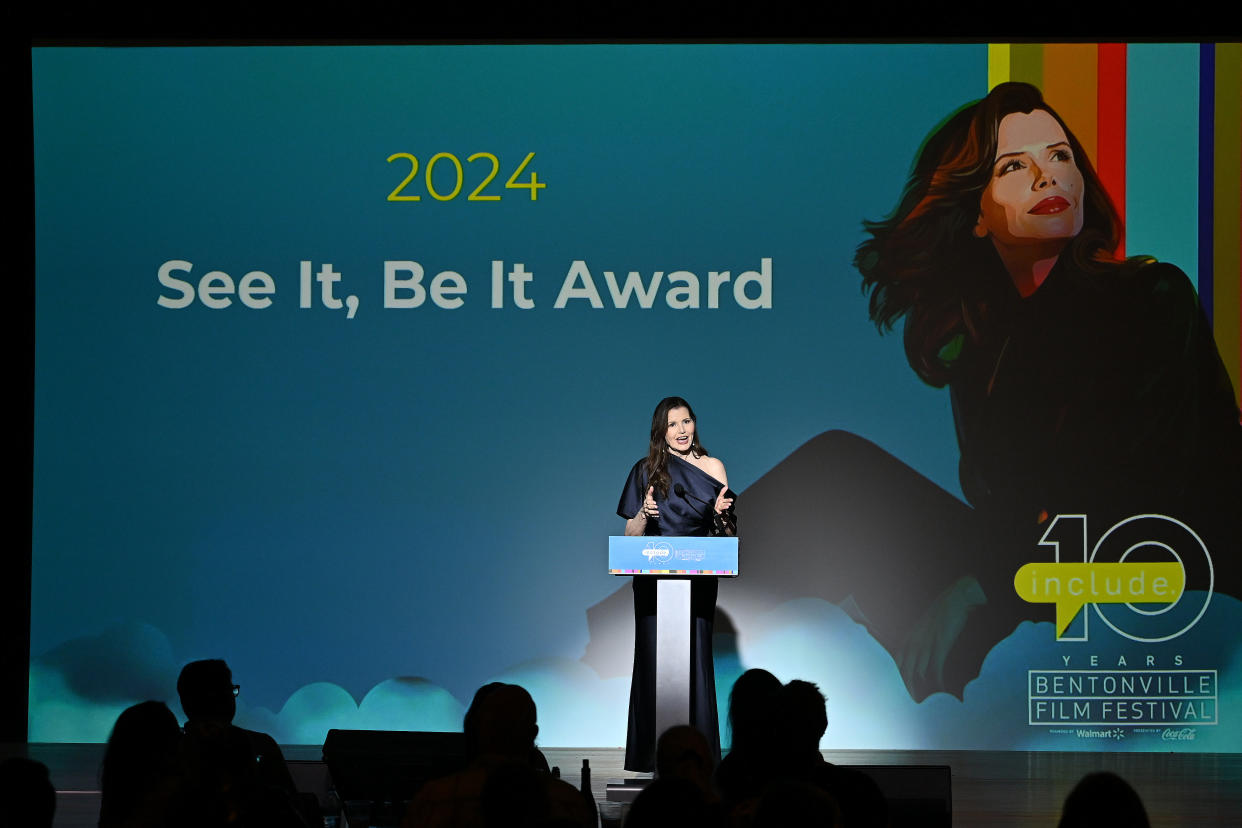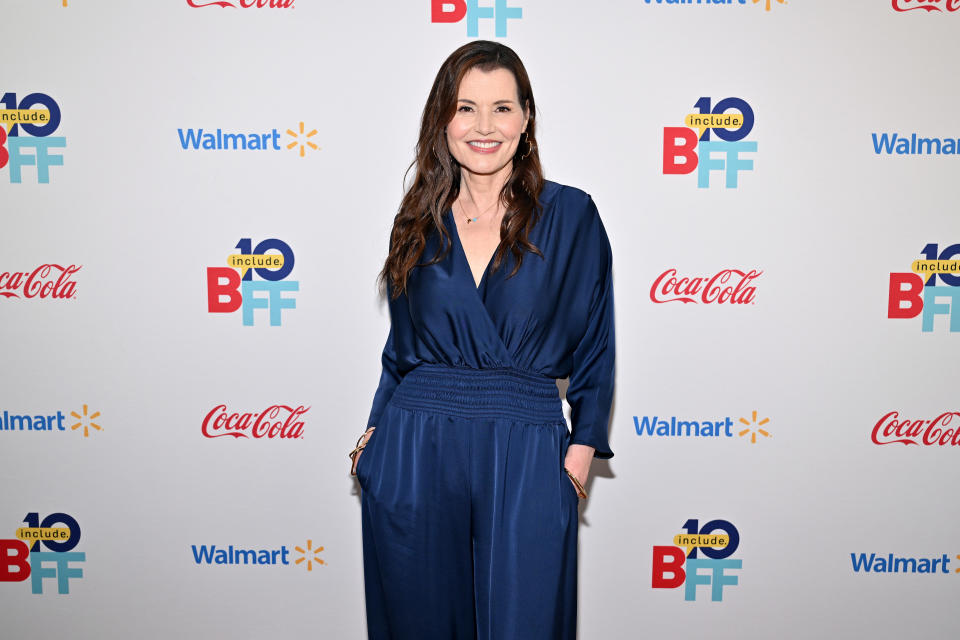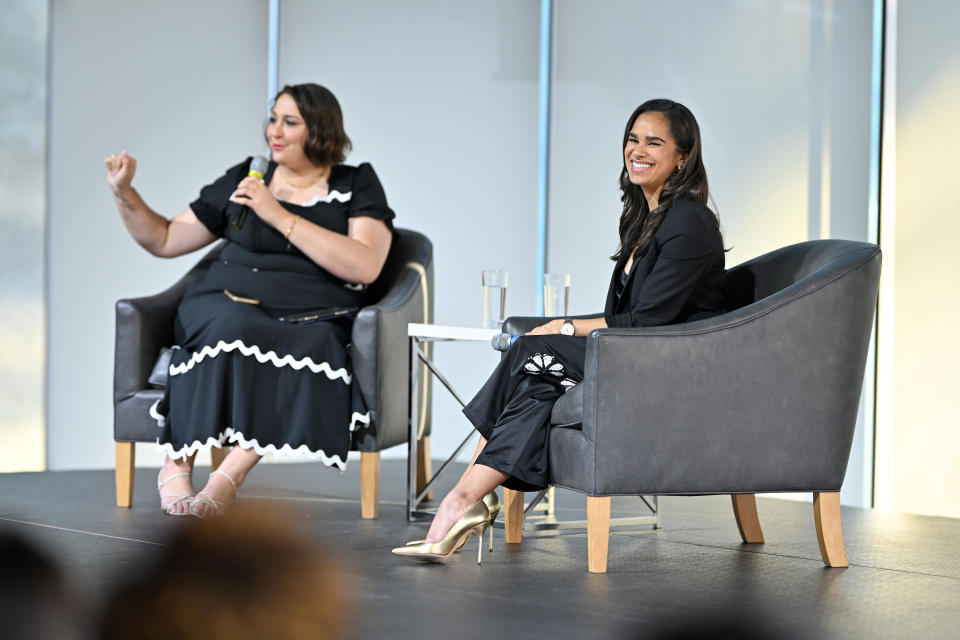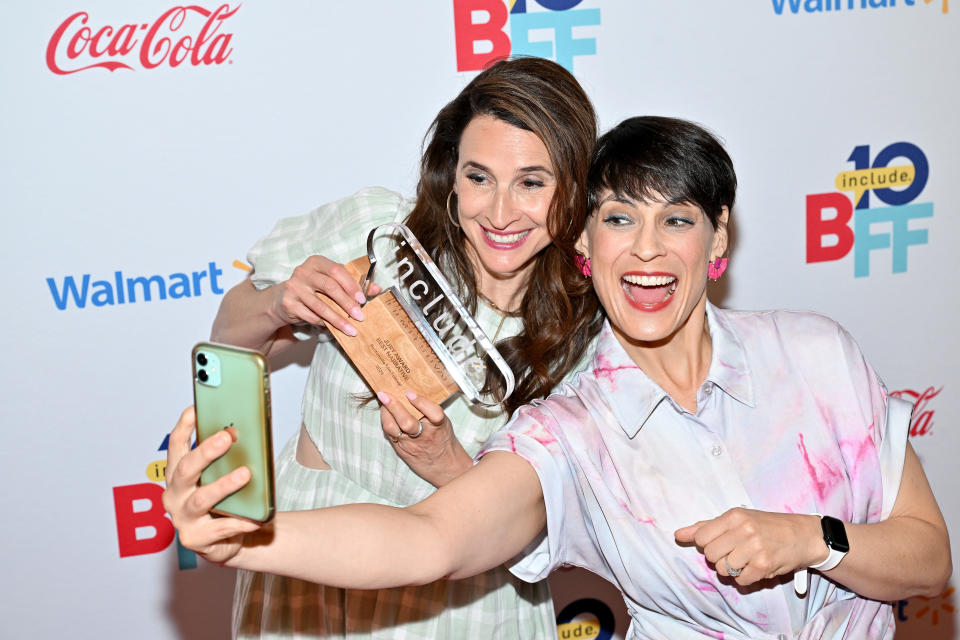Armed with a Big Mission and Even Bigger Bucks, the Bentonville Film Festival Might Be the Fest of the Future

When the Bentonville Film Festival debuted 10 years ago in a relatively sleepy Northwest Arkansas town, many wondered about the viability of a film industry event set in a place that didn’t even have its own movie theater.
When I visited Bentonville in 2015 for the first edition of the festival, founded by Geena Davis and then-ARC Entertainment executive Trevor Drinkwater (with lots of financial backing from founding sponsor and hometown corporation Walmart), movies were shown all over town: At churches, schools, outdoor parks. They were not shown in movie theaters.
More from IndieWire
When I returned to Bentonville last week for the festival’s 10-year anniversary, that had changed. Yes: Bentonville has a movie theater of its own. It’s just one of many upgrades to the growing festival, one that continues to succeed in a fraught period for the industry at large, but for smaller festivals in particular. While some of our best-known festivals are suffering — Sundance is looking for a new home, TIFF has lost major sponsors, Slamdance has relocated to another state, Los Angeles is still looking for its marquee event after the ending of LAFF and the changes at AFI FEST, the list goes on — Bentonville is blossoming.
And while the function and purpose of BFF is very different than that of Sundance or TIFF, even a three-day trip to Arkansas provided plenty of lessons that other fests, regional and bigger, might apply to their events — especially if they want to still be in business for the next 10, 20, 30 years.
Most noticeably: Even when BFF is not happening, its contributions are felt around the town. When BFF packs up, Bentonville doesn’t become a ghost town. It doesn’t lose cultural outlets, it builds on them.
“This community has transformed,” Davis told IndieWire. “It’s really just exploded in 10 years, and it’s fantastic. Every year, there are more fabulous restaurants, they’re building hotels. It’s just a thriving community. It’s an incredible center for the arts. Some people may not realize there’s a world-class art museum here. It just keeps growing. It’s an incredible experience to feel like a part of that and also feel so integrated with the community.”
In the decade since the festival’s inception, the city of Bentonville has grown exponentially — the city’s population has more than doubled since 2010 — undoubtedly bolstered by those big Walmart bucks that are apparent everywhere, not only at the festival. A new Walmart home office is coming to the center of town; when I drove by the sprawling campus during the festival, my Uber driver pointed it out, noting that most people already think of it as “a city within a city.”
In 2017, the six-screen, first-run theater Skylight Cinema opened, the first theater in Bentonville since the town’s Plaza Theater closed in 1985. It’s hip and new, with a bar, and it’s just blocks away from the thriving downtown area. It’s where I interviewed Davis last week, and what a feeling to talk to the festival chair about the fest’s growth in an actual movie theater, for the first time! (The Walton family, who founded Walmart and are billionaires because of it, does not own the theater, though it does own the land it sits on as part of their Northwest Arkansas Downtown Revitalization Fund; the chain’s Austin-based LLC leases the land.)
This year, the festival anticipated over 85,000 attendees over the course of the event’s six days, with 75+ feature films, 50+ shorts, and a number of other events to drive that attendance. While the festival mostly relies on weekend attendance for its many events, growing interest inspired them to kick off on Tuesday, June 11 at noon for the first time. (As other festivals did away or scaled down their online components after COVID lockdown, BFF maintains theirs: the fest’s On Demand portal opened the day after in-person events kicked off, and remains online until June 23.)

“We had tremendous support from the local community from the first year, but it’s really grown and grown,” Davis said. “So many incredible people work with us and want to be a part of it and volunteer, attend our panels and our events and those screenings. We have a bigger and bigger outdoor presence. We launched our outdoor movie theater.”
At the festival’s headquarters, now centered at The Momentary (a former cheese factory turned arts space that was revamped for its new purpose by, yes, the Walton family; it opened in 2020), the Walmart and Coca Cola (the beverage giant is a presenting sponsor, and has been from the start) influence was constantly apparent. Fridges at the filmmakers’ lounge and the single theater space were crammed with all manner of Coke products (SmartWater and Dasani). Outside, a children’s village was packed with toy giveaways (sponsored by Walmart!). On Thursday evening, while “The Hunger Games” played on the massive outdoor screen (the Geena Davis Outdoor Theater, minted in 2022), kids were everywhere. Someone in a Bluey costume wandered by. So did a Dora the Explorer.
Event attendance vacillates: a Thursday evening screening of Lisa D’Apolito’s documentary “Shari & Lamb Chop” at The Momentary’s Fermentation Hall had about 25 people in the audience, while a pair of distinctly industry-focused panels this writer moderated in that same space the next day nearly doubled that amount. On Wednesday evening, an event co-hosted by Variety that showcased ballerina and filmmaker Misty Copeland was exceptionally well-attended, as around 400 people packed into Crystal Bridges’ main hall to watch the Copeland-starring and -produced short “Flower” and see Copeland chat with Variety film reporter Katcy Stephan.
No matter the size of an event’s audience, however, there was a common thread: eager and attentive attendees, many of whom came prepared with questions to ask at panels and post-screening Q&As. These audiences were not just excited to be there, but excited to be part of the festival. That kind of energy seems to only be growing.

Perhaps that’s due to one thing that has not changed for BFF over the course of a decade: its mission. The festival was created with the express intent to “champion women and diversity in film.” All submissions must meet a variety of criteria that further the fest’s aim to “intentionally exhibit diverse and inclusive productions” to build a “film program [that] highlights stories and storytellers that are underrepresented in media.” Those criteria center on identity in front of and behind the camera, including everything from age to sexual identity, size to race.
“The whole goal is to show people that diversity behind the camera and onscreen enriches films, and also they make more money,” Davis said. “It’s been shown. It wasn’t our research, but research has shown that the more diverse a film is, the more box office, which really makes so much sense.”
The most recent UCLA Hollywood Diversity Report backed that up, along with other, similar studies over the past few years: female directors or people of color hire more diverse casts, and movies with more diverse casts outperform the least diverse films at the box office and in streaming ratings.
When BFF was launched in 2015, its corporate bonafides weren’t exactly viewed as a pro. A Walmart-sponsored festival? Built around diversity? For some, that sounded like just talk.
Davis, however, is clear: “This was Walmart’s idea, to launch a film festival that would focus on diversity. We’ve been profoundly grateful for their support. Coke has been an absolutely instrumental sponsor from the very beginning too. So supportive, so wonderful, and they helped encourage other corporations to become sponsors as well.”
A decade ago, it was certainly easier to question the viability and purpose of a festival seemingly beholden to corporate interests. But it’s 10 years later, and BFF is still here. “You need money to be able to make these accomplishments and have an event of this caliber,” Davis said. “We’re very, very, very grateful. We want to know that our sponsors’ hearts are in it, and they definitely are.”
Looking forward, Davis wants Bentonville to get “bigger and bigger.” That includes further growth of “the impact that the festival has on the industry.” As she noted, “We have all the studios participate in it and support it. … What we’re trying to do is give smaller films and maybe first-time filmmakers an experience of being able to meet decision-makers.” As a first-time filmmaker, you are unlikely to sell your film at BFF, which does not hold an official market, but ideally, you will connect with both audiences and bigwigs who will assist your next steps in the industry.

When it comes to other festivals, Davis is heartened by the emergence of more initiatives that reflect interest in the very foundation of BFF. “Some festivals do have initiatives for women or people of color, which is incredible,” Davis said. “We went whole hog in this one. That’s our thing. All of it.”
And while Davis doesn’t often have time to hit up other festivals, she admitted, she’s grateful for the synergy — not of the corporate kind — between some of them. “Other film festivals have been very supportive,” she said. “We get a lot of encouragement and help from Tribeca and from Sundance, where there’ll be recommending movies to say, ‘We showed this, it’s great for your audience as well.’ We’re just showing that it works, that people are profoundly interested in this kind of entertainment.”
When I mentioned that Sundance was looking for a potential new home, the typically quite polite and on-message star cut in: “A new home? Like leave Utah?”
And while Davis is, as I’ve reminded people I’ve shared this story with, a two-time Oscar-winning actress, I believed her reaction: she didn’t know about Sundance, and it doesn’t seem like she’s eager to welcome them to Bentonville. When I named some other bandied-about possibilities (San Francisco, Chicago, Atlanta, Savannah, and yes, Bentonville), she leaned in with a smile. “And somebody said, ‘Did you ever think of Bentonville’? Get out of our town!”
Best of IndieWire
The Best Father and Son Films: 'The Tree of Life,' 'The Lion King,' 'Nowhere Special,' and More
The 51 Best Sexy Movies of the 21st Century, from 'Spring Breakers' to 'X'
The 14 Best Thrillers Streaming on Netflix in June, from 'Fair Play' to 'Emily the Criminal'
Sign up for Indiewire's Newsletter. For the latest news, follow us on Facebook, Twitter, and Instagram.

 Yahoo News
Yahoo News 
